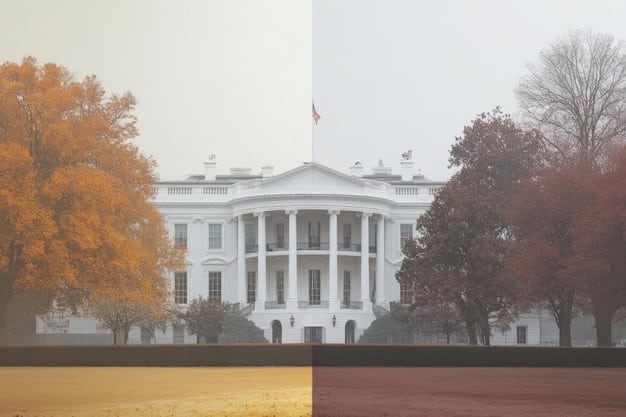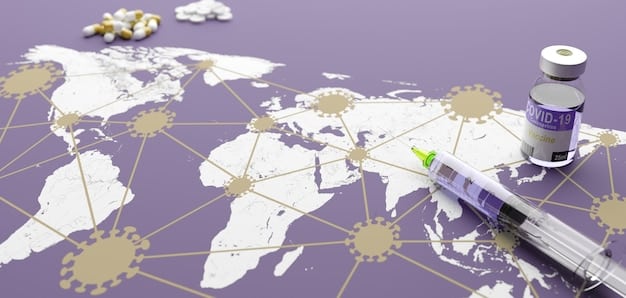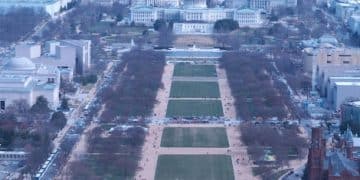US Rejoining WHO: Implications for Global Health Diplomacy in 2025

The implications of the US rejoining the WHO in 2025 encompass strengthened global health initiatives, renewed diplomatic ties in health governance, and a more robust, collaborative approach to tackling worldwide health crises and advancing global health security.
The potential return of the United States to the World Health Organization (WHO) in 2025 carries significant weight, especially considering its far-reaching implications for global health diplomacy. What are the Implications of the US Rejoining the WHO for Global Health Diplomacy in 2025? The answer involves complex interplay of politics, funding, and international cooperation, setting the stage for a transformed landscape of global health governance.
The Backdrop: US’s Shifting Relationship with the WHO
The relationship between the US and the WHO has seen considerable fluctuation in recent years, marked by periods of strong support and abrupt withdrawal. Understanding this history is crucial to appreciating the potential impact of a renewed partnership.
A Timeline of Engagement
The US has historically been a major contributor to the WHO, both financially and strategically. However, shifts in political administration have led to dramatic changes in this dynamic.
- Early Support: The US played a key role in the formation of the WHO and has consistently provided substantial funding and expertise.
- Recent Withdrawal: The previous administration halted funding and announced its withdrawal from the WHO, citing concerns over its handling of the COVID-19 pandemic and alleged bias.
- Potential Re-engagement: The current administration has rejoined the WHO, signaling a renewed commitment to global health cooperation. A potential change in administration in 2025 could reverse this.
These shifts underscore the fragile nature of international agreements and the influence of domestic politics on global health initiatives.

The implications of these changes extend beyond mere funding. They affect the WHO’s ability to coordinate international responses to health crises, set global health standards, and support countries in need.
Financial Implications: Restoring Funding and Influence
One of the most immediate and tangible impacts of the US rejoining the WHO is financial. The US is a major donor, and its contributions are essential for the organization to carry out its mandate.
Reinstating US Contributions
The restoration of US funding can have a ripple effect, enabling the WHO to expand its programs and initiatives across the globe.
This financial boost can bolster efforts in areas such as disease eradication, health system strengthening, and emergency response. Additionally, it can enhance the WHO’s capacity to support low- and middle-income countries in improving their health infrastructure and addressing their most pressing health challenges.
Influence on Budget Allocation
Beyond simply providing funds, the US also has the power to influence how the WHO allocates its resources. This influence can be used to promote specific health priorities and ensure that funds are used effectively.
- Prioritization of Key Areas: The US can advocate for increased funding for areas such as pandemic preparedness, antimicrobial resistance, and non-communicable diseases.
- Accountability and Transparency: The US can push for greater accountability and transparency in the way the WHO manages its finances and programs.
- Strategic Investments: The US can work with the WHO to identify strategic investment opportunities that can yield the greatest impact on global health.
This influence, however, requires balancing domestic priorities with global needs, ensuring that the WHO remains an effective and impartial global health leader.
The financial implications extend beyond the direct contributions. The US’s presence can also encourage other countries to increase their support, fostering a more robust and sustainable funding model for the WHO.
Diplomatic Ramifications: Strengthening Global Health Governance
The US’s engagement with the WHO is not just about money; it’s also about diplomacy. By rejoining the WHO, the US can once again play a leading role in shaping global health policy and governance.

Restoring US Leadership
The US has historically been a leader in global health, and its absence from the WHO has left a void. Rejoining the WHO allows the US to reclaim its leadership position and work with other countries to address global health challenges.
This leadership can manifest in several ways, including setting the agenda for global health discussions, advocating for specific policies and initiatives, and helping to broker agreements between countries.
Enhancing Multilateral Cooperation
Global health challenges require a coordinated, multilateral response. The US’s participation in the WHO strengthens multilateral cooperation and enhances the organization’s ability to address these challenges effectively.
- Improved Coordination: The US can work with the WHO and other countries to improve coordination of global health efforts, ensuring that resources are used efficiently and effectively.
- Enhanced Information Sharing: The US can share its expertise and resources with other countries, helping them to build their capacity to address health challenges.
- Joint Initiatives: The US can work with the WHO and other countries to launch joint initiatives that address specific health issues, such as disease outbreaks and health system strengthening.
However, successful multilateralism requires navigating differing national interests and building consensus on complex health issues, a task that requires both diplomatic skill and commitment.
The diplomatic ramifications of the US rejoining the WHO extend beyond the organization itself. It can also strengthen relationships with other countries and improve the overall climate for international cooperation.
Policy Implications: Shaping Global Health Agendas
The US rejoining the WHO brings about significant policy implications, allowing the nation to influence and shape global health agendas in critical areas.
Setting Global Health Standards
One of the key roles of the WHO is to set global health standards and guidelines. The US’s participation in the WHO allows it to influence these standards and ensure that they reflect the latest scientific evidence and best practices.
This influence can extend to various areas, including disease prevention and control, health system strengthening, and emergency preparedness. The US can advocate for standards that promote innovation, efficiency, and equity in health care delivery.
Advocating for Specific Policies
The US can use its position within the WHO to advocate for specific policies that align with its global health priorities. This can include policies related to:
- Pandemic Preparedness: Promoting investments in early warning systems, research and development, and vaccine manufacturing.
- Antimicrobial Resistance: Reducing the overuse of antibiotics and promoting the development of new antimicrobial drugs.
- Non-Communicable Diseases: Implementing policies to reduce risk factors such as tobacco use, unhealthy diets, and physical inactivity.
However, promoting specific policies requires careful consideration of diverse cultural and economic contexts, ensuring that they are both effective and appropriate for different settings.
The policy implications of the US rejoining the WHO extend beyond the immediate health sector. They also have implications for trade, security, and development.
Impact on Pandemic Preparedness and Response
The COVID-19 pandemic highlighted the critical importance of pandemic preparedness and response. The US’s engagement with the WHO can significantly enhance global efforts in this area.
Strengthening Global Surveillance
One of the key lessons learned from the pandemic is the need for stronger global surveillance systems. The US can work with the WHO to improve these systems and ensure that outbreaks are detected and responded to quickly and effectively.
This can involve investing in laboratory capacity, developing new diagnostic tools, and improving data sharing mechanisms. The US can also share its expertise in epidemiology and public health to help other countries strengthen their surveillance systems.
Enhancing Vaccine Development and Distribution
Vaccines are a critical tool in the fight against pandemics. The US can work with the WHO to accelerate vaccine development and ensure that vaccines are distributed equitably around the world.
- Investing in Research and Development: Supporting research to develop new and improved vaccines.
- Promoting Manufacturing Capacity: Helping to build manufacturing capacity in low- and middle-income countries.
- Ensuring Equitable Distribution: Working to ensure that vaccines are distributed fairly, regardless of a country’s income level.
Achieving these goals requires overcoming challenges related to intellectual property rights, technology transfer, and supply chain management, necessitating a collaborative and coordinated approach.
The impact on pandemic preparedness and response extends beyond vaccines. It also involves strengthening health systems, improving communication, and building public trust.
The Role of Politics and Future Uncertainties
Despite the potential benefits, the US’s relationship with the WHO remains subject to political dynamics and future uncertainties. Changes in administration and shifts in policy priorities could once again alter the course of this partnership.
Domestic Political Considerations
The US’s engagement with the WHO is influenced by domestic political considerations. Public opinion, congressional support, and the priorities of the administration in power all play a role.
Maintaining a stable and predictable relationship with the WHO requires building bipartisan support and ensuring that global health remains a priority, regardless of political affiliations.
Geopolitical Factors
Geopolitical factors can also impact the US’s relationship with the WHO. Tensions with other countries, competing interests, and shifting alliances can all affect the dynamics of global health governance.
- Balancing National Interests: Navigating the complexities of international relations while promoting global health objectives.
- Addressing Competing Priorities: Reconciling domestic needs with global responsibilities.
- Maintaining Neutrality: Ensuring that the WHO remains an impartial and objective organization, free from political influence.
The success of the US’s engagement with the WHO depends on its ability to navigate these political and geopolitical challenges, maintaining a steadfast commitment to global health.
The future of the US’s relationship with the WHO is uncertain. However, by recognizing the potential benefits and addressing the challenges, the US can play a leading role in shaping a healthier and more secure world.
| Key Point | Brief Description |
|---|---|
| 🤝 Restored Funding | US rejoining boosts WHO’s budget, enhancing global health programs |
| 🌍 Diplomatic Influence | US leadership shapes global health policy and governance within the WHO |
| 🛡️ Pandemic Preparedness | US supports global surveillance and vaccine distribution efforts through the WHO |
| ⚕️ Policy Setting | US helps set global health standards and policies, influencing health agendas |
FAQ
▼
The immediate benefits include the restoration of US financial contributions, which strengthen the WHO’s budget. This enables the WHO to expand critical health programs and initiatives globally, especially in underfunded areas.
▼
US re-engagement strengthens global health diplomacy by restoring US leadership and influence within the WHO. This enhances multilateral cooperation and coordination in addressing complex health challenges worldwide.
▼
The US plays a crucial role in setting global health policies by advocating for evidence-based standards and guidelines. This ensures that global health efforts are aligned with the latest scientific knowledge and best practices.
▼
US participation enhances pandemic preparedness by strengthening global surveillance systems. It also accelerates vaccine development, ensuring that vaccines are distributed equitably and efficiently worldwide.
▼
Political challenges include domestic political considerations and geopolitical factors. These influence the consistency of US support and can affect the dynamics of global health governance, requiring careful navigation.
Conclusion
In conclusion, the implications of the US rejoining the WHO in 2025 are multifaceted, spanning financial, diplomatic, policy-related, and pandemic preparedness domains. Despite the uncertainties, a sustained commitment by the US can significantly enhance global health, improve international relations, and contribute to a more secure and healthy world.





